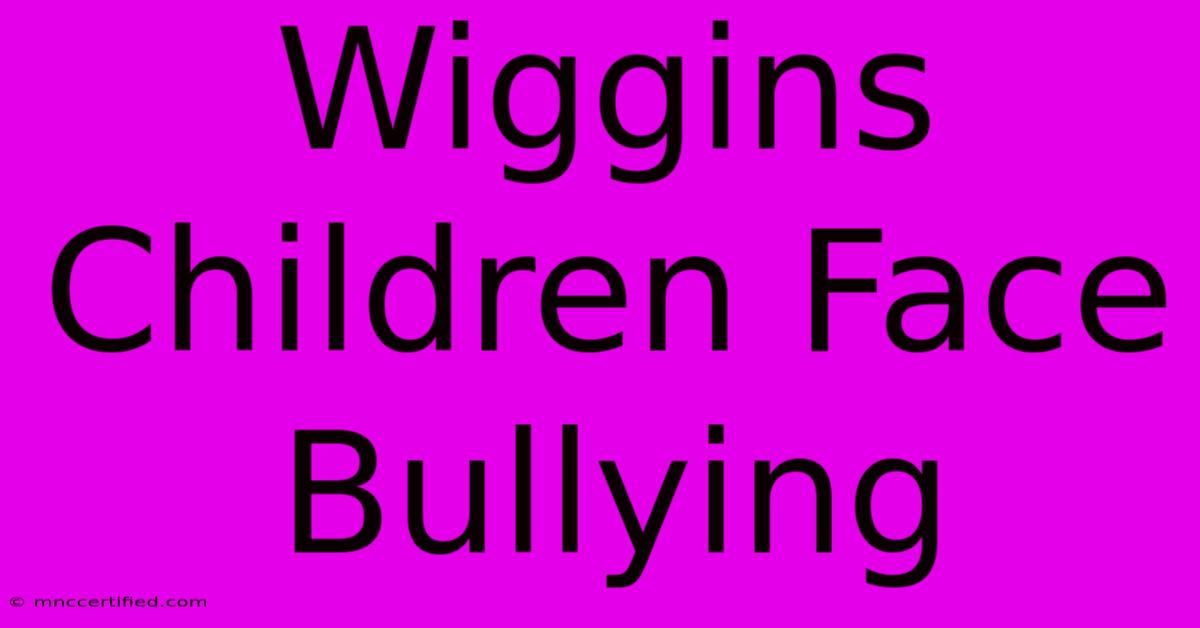Wiggins Children Face Bullying

Table of Contents
Wiggins Children Face Bullying: Understanding the Impact and Finding Solutions
Bullying is a pervasive issue affecting children worldwide, and the Wiggins children are unfortunately not immune. This article delves into the challenges faced by children bearing this surname who experience bullying, exploring the various forms it can take, its devastating impact, and crucially, the strategies parents and educators can employ to combat this pervasive problem.
Understanding the Forms of Bullying Targeting Wiggins Children
Bullying isn't a monolithic issue; it manifests in diverse and insidious ways. Wiggins children, like any other children, can be targeted through:
- Verbal Bullying: This involves name-calling, teasing, spreading rumors, and making hurtful comments, often focused on the child's name, appearance, or perceived differences. For instance, a child might be taunted with rhymes or insults incorporating the surname "Wiggins."
- Physical Bullying: This encompasses hitting, kicking, shoving, spitting, and other forms of physical aggression. The intensity can range from minor incidents to severe violence.
- Cyberbullying: With the proliferation of technology, online bullying has become increasingly prevalent. This includes spreading rumors through social media, posting embarrassing photos or videos, or sending threatening messages. The anonymity of the internet often emboldens bullies targeting Wiggins children online.
- Social Bullying: This more subtle form involves excluding a child from social groups, spreading malicious gossip, or manipulating relationships to isolate the victim. Wiggins children might find themselves ostracized from activities or friend groups.
- Relational Bullying: This type of bullying aims to damage a child's reputation and relationships with others. It can involve manipulating friendships or spreading lies to turn others against the victim.
The Devastating Impact of Bullying on Wiggins Children
The consequences of bullying extend far beyond the immediate incident. For Wiggins children experiencing this, the effects can be profound and long-lasting:
- Emotional Distress: Bullying can cause significant emotional distress, leading to anxiety, depression, low self-esteem, and feelings of isolation and helplessness.
- Academic Performance: The stress and anxiety associated with bullying can negatively impact a child's concentration and academic performance, leading to decreased grades and school avoidance.
- Physical Health Problems: Bullying has been linked to various physical health problems, including headaches, stomach aches, sleep disturbances, and weakened immune systems.
- Long-Term Mental Health Issues: In severe cases, prolonged bullying can contribute to the development of long-term mental health issues, such as anxiety disorders, depression, and post-traumatic stress disorder (PTSD).
Strategies for Combating Bullying Against Wiggins Children
Addressing bullying requires a multi-pronged approach involving parents, educators, and the community. Here are some crucial strategies:
For Parents:
- Open Communication: Foster a safe and open communication environment where Wiggins children feel comfortable discussing their experiences without fear of judgment.
- Early Intervention: Address any signs of bullying immediately. Don't dismiss a child's concerns; take them seriously and investigate.
- Empowerment: Equip Wiggins children with coping mechanisms and strategies to deal with bullying situations. This could involve assertiveness training or conflict resolution skills.
- School Collaboration: Work closely with school officials to address bullying incidents and implement preventative measures.
For Educators:
- Anti-Bullying Programs: Implement comprehensive anti-bullying programs that educate students about different forms of bullying and promote empathy and respect.
- Zero-Tolerance Policies: Enforce strict zero-tolerance policies against bullying, ensuring swift and consistent consequences for bullies.
- Bystander Intervention: Train students to intervene safely when they witness bullying incidents.
- Create a Supportive Environment: Foster a school culture that values kindness, respect, and inclusivity.
For the Community:
- Awareness Campaigns: Raise awareness about bullying through community events and campaigns.
- Support Groups: Provide support groups for bullied children and their families.
- Collaboration: Encourage collaboration between schools, parents, and community organizations to address bullying comprehensively.
Conclusion: Protecting Wiggins Children from Bullying
Bullying is a serious issue with potentially devastating consequences for children. By understanding the different forms of bullying, its impact, and the strategies to combat it, we can create safer and more supportive environments for all children, including those who bear the surname Wiggins. Open communication, proactive intervention, and a collaborative approach are essential in protecting children from the harmful effects of bullying and fostering a culture of respect and kindness. Remember, seeking professional help from counselors or therapists is crucial if bullying significantly impacts a child's well-being.

Thank you for visiting our website wich cover about Wiggins Children Face Bullying. We hope the information provided has been useful to you. Feel free to contact us if you have any questions or need further assistance. See you next time and dont miss to bookmark.
Featured Posts
-
Next Series Dent For Wallace
Dec 19, 2024
-
Millions In Unpaid Taxes Seized By Uk Police
Dec 19, 2024
-
Verstappens Take Perez Exits Red Bull
Dec 19, 2024
-
Andrew And Tristan Tate Facing What Charges
Dec 19, 2024
-
Newsom Strengthens Californias State
Dec 19, 2024